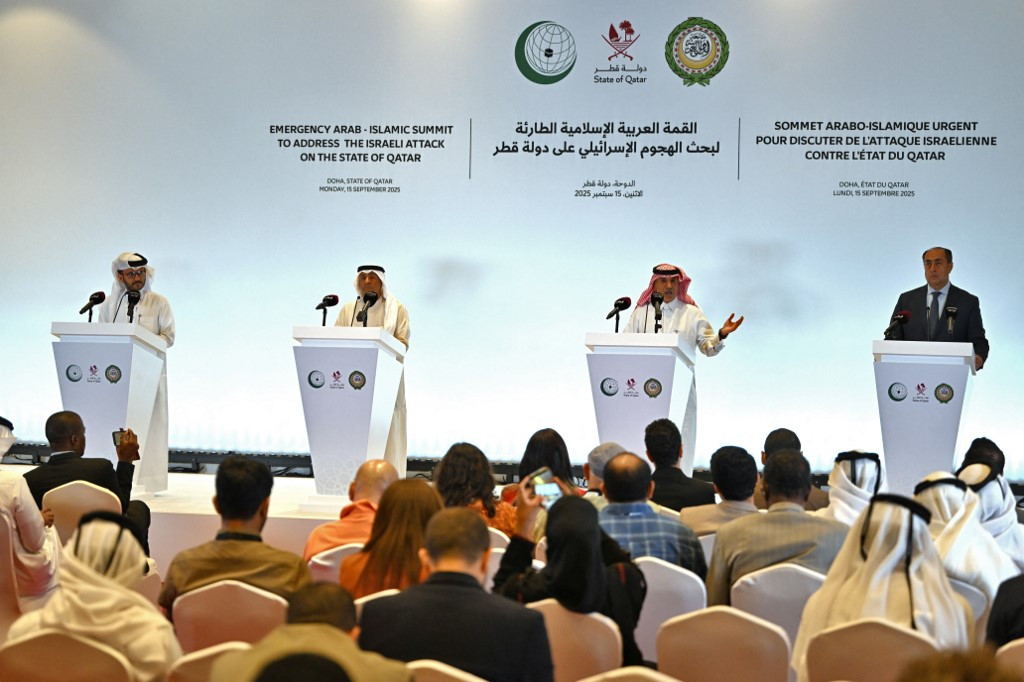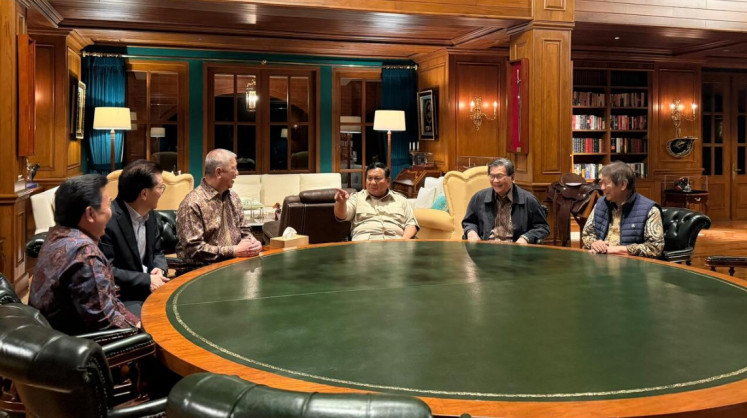Popular Reads
Top Results
Can't find what you're looking for?
View all search resultsPopular Reads
Top Results
Can't find what you're looking for?
View all search resultsWhat the Doha summit revealed about the OIC
Strong words from top leaders but few enforceable steps has characterized the Organisation of Islamic Cooperation for the last five decades. Why does it still matter?
Change text size
Gift Premium Articles
to Anyone
 Representatives of Gulf states (from left), Qatari foreign ministry spokesperson Majed al-Ansari, Gulf Cooperation Council (GCC) Secretary-General Jassim al-Budaiwi, Organisation of Islamic Cooperation (OIC) Assistant Secretary-General Youssef Al-Dobeay and Arab League Deputy Secretary-General Hossam Zaki address a press conference on Sept. 15 during the 2025 Emergency Arab-Islamic Summit in Doha. (AFP/Mahmud Hams)
Representatives of Gulf states (from left), Qatari foreign ministry spokesperson Majed al-Ansari, Gulf Cooperation Council (GCC) Secretary-General Jassim al-Budaiwi, Organisation of Islamic Cooperation (OIC) Assistant Secretary-General Youssef Al-Dobeay and Arab League Deputy Secretary-General Hossam Zaki address a press conference on Sept. 15 during the 2025 Emergency Arab-Islamic Summit in Doha. (AFP/Mahmud Hams)
I
sraeli air strikes on a residential compound in Doha on Sept. 9 killed at least six people, including one Qatari security officer. The strike was unexpected because Qatar is a close United States ally, host to a major US airbase and accredited broker of Middle Eastern diplomacy.
Within days, Qatar called for an extraordinary joint summit with the Organisation of Islamic Cooperation (OIC) and the Arab League. It brought together leaders and foreign ministers of 57 nations on Sept. 15 in Doha and was billed as a time for the Muslim world to deliver a strong and united message.
Its communiqué condemned Israel’s strike as a blatant violation of international law, reaffirmed solidarity with Qatar, called for immediate humanitarian assistance and restated support for a two-state solution, with East Jerusalem as the capital of the State of Palestine. It also advocated the Gaza reconstruction plan launched in March at the Arab Summit in Cairo.
Yet the Doha summit’s final statement was remarkable for what it did not say. There was no sanction, no oil embargo, no suspension of diplomatic relations and no collective deterrence plan. Suggestions made by some member state delegations, such as reviewing relations with Israel or an arms boycott, were not pursued.
Most people were disappointed with the outcome. The assembly of such a wide leadership had sparked expectations for so much more. But the product was typical of past OIC conferences: strong rhetorical statements, weak enforcement. That pattern is not an accident; it is ingrained into the organization’s DNA.
The Arab-Islamic extraordinary summit was one more link in a long chain of the OIC’s responses to Israeli aggression. Created to unify the Muslim world’s stance, the organization reliably issues forceful communiqués yet rarely progresses to action.
The summit in Doha echoed Arab-Islam extraordinary summits in Riyadh, foreign ministers’ regular session in Istanbul, foreign ministers’ extraordinary meetings in Jeddah and a side event at a United Nations ministerial meeting in New York. Those meetings carried the same strong voice of condemnations, solidarity, calls for a ceasefire and a two-state solution.
The pattern is consistent: strong words, but no actions.
The OIC was founded in 1969 following the arson attack on Jerusalem’s Al-Aqsa Mosque and developed as the “collective voice of the Muslim world”. Today, it is the second-largest international body after the UN, but it was hampered from the beginning by structure and politics.
First, consensus rules: All OIC decisions require broad consensus. That protects fragile regimes but turns ambitious initiatives into lowest-common-denominator statements.
Second, sovereignty first: The OIC is not like the European Union. It possesses no supranational sovereignty and cannot compel members; it can merely persuade and coordinate.
Third, divergent interests: Members range from US-aligned monarchies to revolutionary republics. Some maintain open ties with Israel, others refuse any recognition.
The outcome: The OIC is brilliant at releasing joint statements of principle, but is struggling to move from symbolism into strategy.
It is not alone, however. The list of international organizations that have failed to take real action on critical issues is long. Even the UN Security Council has been frozen over Gaza by big powers’ vetoes. ASEAN has ben unable to carry out its peace plan in Myanmar due to its own system of consensus. The European Union, though much more integrated, has often froze on foreign policy matters requiring unanimity.
The Arab-Islamic summit’s statement was thus less an exception and more a symptom of a deeper multilateral breakdown in the modern world.
The frustrations in Doha brought back an old thought. Iran and Egypt, along with some other nations, resurfaced the proposal of forming an “Islamic NATO”, a military alliance of Muslim-majority nations within the OIC umbrella.
They contend that it would take a united Islamic army to dissuade Israel from future aggression, but the notion is still in the realm of fantasy. Who would command the alliance? Could they ever coexist under one command? Political competition, divergent alliances and variations in threat perception have ruined past endeavors.
Far more significantly, the actual deterrent is not lack of military power. Various OIC nations have strong armies, including at least one with nuclear weapons, Pakistan. The greater issue is Israel’s impunity, reinforced by the backing it receives from its close alliance with the US. An Islamic NATO would not do away with that; it might even turn the conflict into a greater war.
So if the OIC cannot deter Israel, what is its relevance?
First, it is unique. There is no other intergovernmental organization founded on religion instead of geography or economics. It lends a formal diplomatic voice to the Muslim ummah (a transnational, imagined community) in today’s post-caliphate era.
Second, it provides a platform for grievances and aspirations. On Palestine, Kashmir, the Rohingya and Islamophobia in the West, the OIC provides Muslim-majority nations with a united platform on which to air their voices. That collective symbolism makes a difference for domestic constituents and for foreign policy.
Third, the OIC is about something other than politics. It harmonizes development programs, humanitarian assistance, scientific cooperation and people-to-people exchange. Organizations such as the Islamic Development Bank have sponsored projects throughout Asia and Africa. These “low politics” projects yield tangible returns and keep the organization in the game.
Finally, the OIC’s survival is crucial. For more than five decades, it has upheld an alliance of virtually all Muslim-majority governments. It embeds pan-Islamic identity within the state-centric international system, sustaining a sense of Muslim solidarity even as member governments pursue divergent national interests.
This month’s Doha summit was an example of the possibilities and the limits of Islamic multilateralism.
Whether the OIC is capable of reinventing itself, theoretically through improving work on human development, better decision-making or other means of achieving greater credence, is open to doubt. Until that time, it still remains a platform of unity, a voice for Muslim causes and a reflection of the broader challenges of international governance.
---
The writer is a doctoral research fellow in international relations at Gadjah Mada University. This article is republished under a Creative Commons license.










